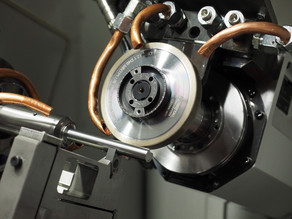Analysis and modeling of the process chain for the manufacturing of drilling and threading tools out of powder metallurgical high-speed steel – SPP 2476
The quality and performance of cutting tools depend on the properties of the cutting tool material, the geometry of the tool and the cutting edges. Moreover, the topography and the characteristics of the subsurface zone are influencing factors as well. With respect to cutting tools out of powder-metallurgical high-speed steel, such as threading tools, this refers to the material properties and microstructure. Therefore, it is important to include the whole process chain and the interactions between the process steps in the optimisation process, to achieve the overall enhancement of the cutting tools. This comprises the production of the PM steel, the forming process, the heat treatment and the final grinding process. The grinding process defines the shape of the tools as well as the surface topography and surface integrity. Due to thermomechanical loads in grinding, the material properties and microstructure are altered, taking into account the interactions with the heat treatment as well. On the one hand, the grinding process must be adjusted with respect to productivity. On the other hand, thermal damage of the tools has to be avoided. To reach this goal, the whole process chain including the forming processes, the heat-treatment and the grinding must be taken into account with respect to the fundamental understanding of the process chain and its interactions.
For the optimisation, a tool and workpiece model have to be developed, which allow to indicate the material changes along the process chain. Based on the combination of findings regarding the grinding process and the thermomechanical load with the modeling of the heat treatment, the aim is to adjust the material properties with respect to the process chain, to avoid thermal damage and to achieve an increase in the performance of the cutting tools. Drilling and threading tools out of high-speed steel have been selected as components for the research project.
The project “Analysis and modeling of the process chain for the manufacturing of drilling and threading tools out of powder metallurgical high-speed steel”, funded as part of SPP 2476 “Cross-process Modelling in Production Engineering”, is a collaborative project involving the Chair of Materials Technology (LWT) at Ruhr University Bochum and the Institute of Machining Technology (ISF) at TU Dortmund University. The LWT is responsible for the substrate production and heat treatment, while the ISF is responsible for the grinding technology research. Further information on SPP 2476 can be found at: https://www.mec.ed.tum.de/en/utg/dfg-priority-program-2476/





![[Translate to English:] [Translate to English:]](/storages/isf-mb/_processed_/4/8/csm_Schleifscheiben_8bb5d31229.jpg)